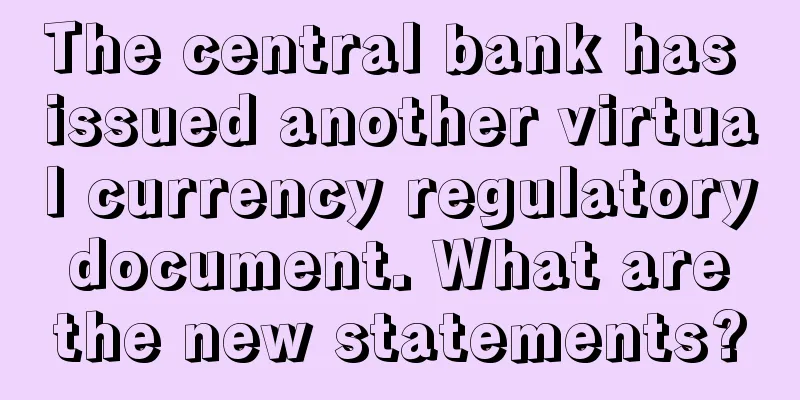|
At 5:00 p.m. yesterday, the People's Bank of China released the "Notice on Further Preventing and Dealing with the Risks of Virtual Currency Trading Speculation" on its official website, which attracted great attention and discussion within the industry.
In the past, the central bank and other regulatory authorities and industry associations have issued a number of documents on preventing the risks of virtual currency speculation, providing clear policy guidance on the nature and speculation of virtual currencies.
Based on past regulatory policies, the document released by the central bank today further updates the conceptual description of virtual currency, and for the first time proposes that there are legal risks in participating in virtual currency investment and trading activities, criminal liability will be pursued, and that the provision of trading services by overseas exchanges is an illegal financial activity. At the same time, it clarifies the punishment mechanisms for a number of illegal acts.
Based on the comparison of today's document of the central bank and several major policy documents in the past, Chain Catcher sorted out the new expressions and new policies that appeared in today's document to help everyone further understand the central bank's policies.
1. Update the description of the concept of virtual currency
In the document released today, the central bank clearly pointed out that virtual currencies such as Bitcoin, Ethereum, and Tether have the main characteristics of being issued by non-monetary authorities, using encryption technology and distributed accounts or similar technologies, and existing in digital form. They are not legal tender and should not and cannot be circulated and used as currency in the market.
Previously, the central bank's description of virtual currency in various documents was mostly descriptions such as "Virtual currency is a specific virtual commodity that is not issued by the monetary authorities, does not have monetary attributes such as legal tender and compulsory nature, is not real currency, and should not and cannot be circulated and used as currency in the market." This document proposed for the first time that virtual currency has the main characteristics of using encryption technology and distributed accounts or similar technologies, and exists in digital form.
2. Ten ministries and commissions participate, and provincial governments at all levels bear overall responsibility
In the document released by the central bank today, ten ministries and commissions, including the People's Bank of China, the Cyberspace Administration of China, the Supreme People's Court, the Supreme People's Procuratorate, the Ministry of Industry and Information Technology, the Ministry of Public Security, the State Administration for Market Regulation, the China Banking and Insurance Regulatory Commission, the China Securities Regulatory Commission, and the State Administration of Foreign Exchange, jointly signed the document at the end. This is the most ministries and commissions involved in all previous encryption regulatory documents. Among them, the Supreme People's Court, the Supreme People's Procuratorate, the Ministry of Public Security, the State Administration for Market Regulation and the State Administration of Foreign Exchange all appeared in such documents for the first time, and proposed to build a multi-dimensional and multi-level virtual currency transaction speculation risk prevention and disposal system.
The document also pointed out that the above-mentioned ten departments jointly established a work coordination mechanism to jointly solve major problems in their work and supervise and guide all regions to carry out their work in accordance with unified arrangements.
In addition, the central bank also proposed for the first time to strengthen local implementation. Provincial-level people's governments are responsible for preventing and dealing with risks related to virtual currency trading speculation within their administrative regions. Local financial regulatory departments will take the lead, and branches of the State Council's financial management departments, as well as the Internet Information Office, telecommunications, public security, market supervision and other departments will participate in establishing a normalized working mechanism, coordinate and mobilize resources, actively prevent and properly handle issues related to virtual currency trading speculation, and maintain economic and financial order and social harmony and stability.
Article 7 of the document also proposes that provincial-level people's governments give full play to the role of local monitoring and early warning mechanisms, combine online monitoring with offline inspections, and improve the accuracy and efficiency of identifying and discovering virtual currency trading speculation activities.
3. For the first time, it was proposed that there are legal risks in participating in virtual currency investment and trading activities
In a document released by the central bank on May 19 this year, it was pointed out that virtual currency-related speculative trading activities involve multiple risks, such as false asset risks, business failure risks, and investment speculation risks. This document clearly points out that there are legal risks in participating in virtual currency investment and trading activities.
The document points out that if any legal person, non-legal person organization or natural person invests in virtual currency and related derivatives and violates public order and good morals, the relevant civil legal acts will be invalid, and the losses caused thereby will be borne by themselves; if they are suspected of disrupting financial order and endangering financial security, they will be investigated and dealt with by relevant departments in accordance with the law.
4. For the first time, it was proposed that criminal liability would be pursued
In the first part of the central bank's document, it is pointed out that activities such as legal currency and virtual currency exchange business, token issuance financing, and virtual currency derivatives trading are suspected of illegal financial activities. This is the same statement as the central bank's document on May 18 this year. However, today's document also clearly pointed out that virtual currency-related business activities are illegal financial activities, and added the statement "strictly prohibited and resolutely banned in accordance with the law" after the paragraph, and pointed out that those who engage in related illegal financial activities that constitute a crime will be held criminally liable in accordance with the law.
Article 12 of the document also points out that after discovering clues of illegal financial activities related to virtual currency, local financial regulatory departments shall work with the branches of the financial management departments of the State Council and other relevant departments to promptly investigate and identify, properly handle, and seriously investigate the legal responsibilities of relevant legal persons, non-legal organizations and natural persons. If a crime is involved, it shall be transferred to judicial authorities for investigation and punishment in accordance with the law.
5. It is clarified for the first time that trading services provided by overseas exchanges are illegal financial activities
In the virtual currency regulatory policies issued by the central bank in the past, they were mainly aimed at domestic virtual currency exchanges. As more and more exchanges move overseas, the central bank also clearly proposed to crack down on overseas virtual currency exchanges, saying that overseas virtual currency exchanges providing services to residents in my country through the Internet are also illegal financial activities.
The document also points out that domestic staff of relevant overseas virtual currency exchanges, as well as legal persons, non-legal organizations and natural persons who know or should know that they are engaged in virtual currency-related businesses and still provide them with marketing, payment settlement, technical support and other services, will be held accountable according to law.
VI. Further strengthen the management of virtual currency-related information
The document points out that it is necessary to strengthen the management of Internet information content and access related to virtual currency. Internet companies are not allowed to provide online business premises, commercial displays, marketing and promotion, paid traffic diversion and other services for virtual currency-related business activities. Any clues of illegal and irregular problems should be reported to the relevant departments in a timely manner, and technical support and assistance should be provided for related investigations and investigative work.
The above content is the same as the document released by the central bank on May 19, but the document also goes on to point out that the Internet information and telecommunications authorities shall promptly close down websites, mobile applications, mini-programs and other Internet applications that carry out virtual currency-related business activities in accordance with the problem clues transferred by the financial management department, and further clarify the punishment mechanism. (Chain Catcher) |










